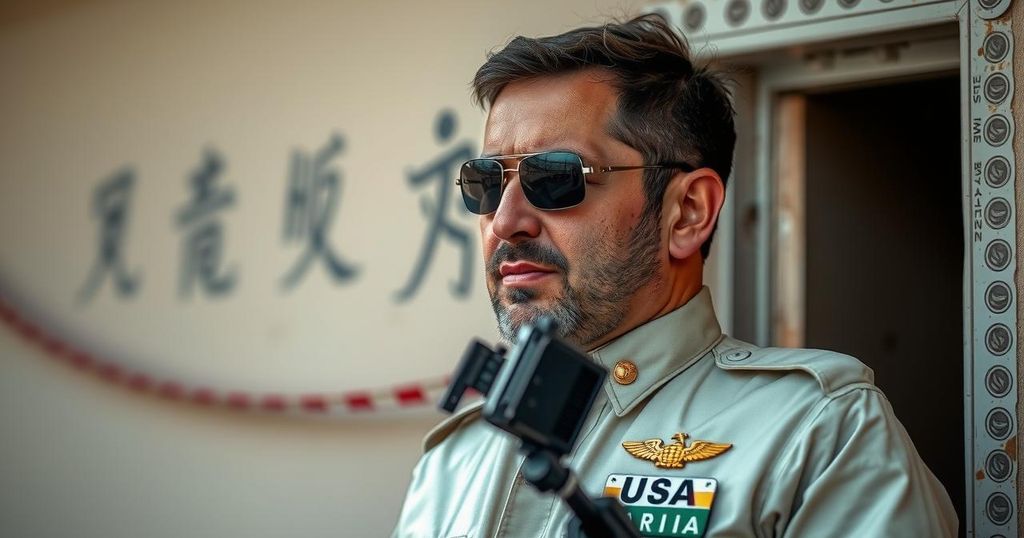Iranian Military Advisor Assassinated in Syria by U.S. Agent, Claims Iranian Official

The Deputy Commander of Iran’s Khatam al-Anbiya Central Headquarters announced the assassination of Iranian military advisor Kiomars Pourhashemi in Syria, attributing the act to a U.S. agent. He dismissed claims implicating a Syrian general as Western misinformation. The situation reflects ongoing tensions in Syria, with implications for Iranian and Syrian military dynamics amid external pressures.
TEHRAN – In a recent announcement, the Deputy Commander of Iran’s Khatam al-Anbiya Central Headquarters, Mohammad Jafar Asadi, claimed that Iranian military advisor Kiomars Pourhashemi was killed in Syria by an infiltrator acting on behalf of the United States. According to Asadi, an American agent was responsible for the assassination of the commander in Aleppo.
Asadi vehemently refuted claims that a Syrian general was behind the killing, denouncing such assertions as “Israeli propaganda aimed at creating discord between Iran and Syria,” and attributing these claims to Western sources. Brigadier General Pourhashemi, affiliated with the Iranian Revolutionary Guard Corps (IRGC), was reportedly martyred on November 28 in Aleppo, but the specifics of his assassination were not initially disclosed.
Reports from CGTN in Ankara suggested that Pourhashemi was shot by a Syrian officer during a meeting in a joint operations room in Aleppo; however, this notion was dismissed by Brigadier General Asadi. Asadi outlined the considerable struggles faced by the Syrian army amidst global opposition, emphasizing their scarcity of basic necessities such as food and water.
He drew parallels with Russia’s difficulties in Syria, attributing their challenges to the ongoing conflict in Ukraine, remarking, “The Russians have been bogged down for a long time, with NATO’s imposed war leaving them unable to do much.” Asadi further articulated the lack of accountability in Syria, expressing that, “In Syria, there’s no accountability anymore; you can blame anyone for any murder.”
Discussing the “National Defense Forces” established in Syria during the tenure of the martyred General Qasem Soleimani, Asadi noted that this force, initially formed with difficulty, did not receive a warm welcome from the Syrian army. He pointed out that, despite persuasion, the force’s numbers diminished from 120,000 to 20,000 as militants received support from Americans and Israelis.
Finally, addressing the potential tensions between Resistance forces and the Syrian regime, Asadi stated that all nations possess individuals who are naturally patriotic and will react to provocations. He strongly asserted, “The humiliation Israel is imposing on Syria now will surely provoke a response from the proud youth of Syria,” signaling the potential for future retaliatory actions against aggression.
The assassination of Iranian military advisors in Syria underscores the complex interplay of regional powers in the ongoing Syrian conflict. Iranian forces, notably the IRGC, have been heavily involved in supporting the Syrian government led by Bashar al-Assad against various opposition groups. The claims made by Iranian officials regarding U.S. involvement reflect the heightened tensions between Iran and the West, particularly in light of Israeli interests in countering Iranian influence in the region. The dynamics within the Syrian army and affiliated groups, such as the National Defense Forces, further complicate the landscape of alliances and enmities in the conflict. The geopolitical ramifications of these assassinations resonate beyond military actions, influencing diplomatic relations and strategic calculations among regional players, including Syria, Iran, and Israel. This aspect is accentuated by the more extensive geopolitical context, including Russia’s involvement and the backdrop of the Ukraine conflict.
In conclusion, the assassination of Brigadier General Kiomars Pourhashemi in Aleppo has sparked significant discourse regarding U.S. involvement and the implications for Iranian-Syrian relations. Deputy Commander Asadi’s assertions reflect a broader narrative of blame directed at external forces, including the United States and Israel, while highlighting the struggles faced by both Iranian and Syrian military entities. The evolving situation remains critical as tensions persist and the potential for retaliatory actions looms.
Original Source: www.tehrantimes.com








